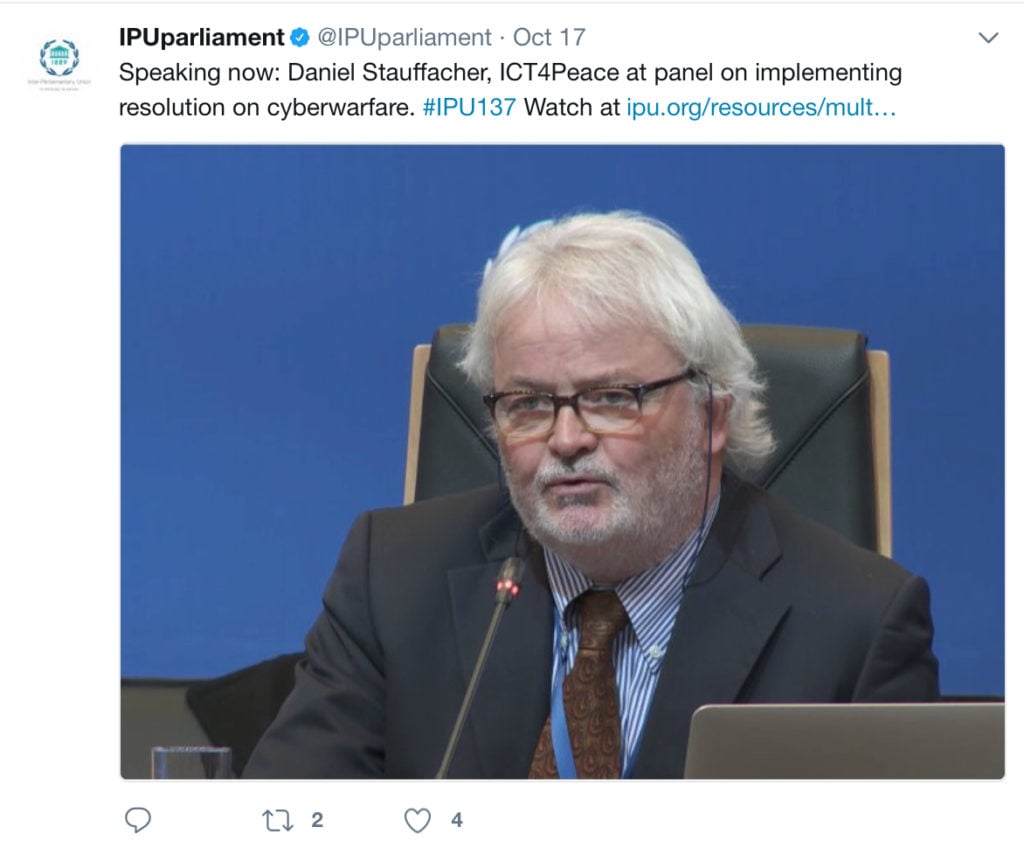ICT4Peace addressing Global Public Prosecutors Meeting on Peace and Security in Cyberspace
ICT4Peace’s Daniel Stauffacher was invited on 12 September 2107 by the International Association of Public Prosecutors 22nd Annual Meeting in Beijing...
3 min read
David Wilkinson Jun 2, 2017 11:49:48 AM
On 23-24 May 2017 David Cliff and Daniel Stauffacher of ICT4Peace were invited to participate in the 2017 OSCE-wide Counter-Terrorism Conference on “Preventing and Countering Violent Extremism and Radicalization that Lead to Terrorism”. Hundreds of representatives of governments, civil society, and academia attended the Hofburg Palace in the heart of the Austrian capital.
David Cliff spoke on the first day and introduced the UN CTED-ICT4Peace - Tech Against Terrorism project (www.techagainstterrorismproject.org), explaining to the hall that there are currently three main strands of the newly created project underway:
David noted that the Tech Against Terrorism project (techagainstterrorism.org) is designed to promote “industry-led self-regulation driven by the desire to build trust between the public and private sector” and help forge a “cooperative public-private environment” in which the effectiveness of online counter-terrorism methods can be improved, while human rights and fundamental freedoms are upheld. His statement can be found in full below.

The project was recently referred to in UN Security Council document S/2017/375 on the “Comprehensive international framework to counter terrorist narratives”, in the context of public-private partnerships.
The need for a holistic approach involving cooperation among the full range of affected actors emerged as a recurrent theme of the conference, particularly the need for closer collaboration between law enforcement and representatives of local communities. One of the meeting’s other recurring themes was the need for better information-sharing - as one speaker put it dealing with the challenge of a “tsunami of data”. Counter-terrorism and combatting organised crime may have overlaps, for instance, that are missed if those working on each don’t talk to one another.
The conference heard discussed how to approach encrypted technologies in a way that strikes the right balance between security and privacy. In a side-event on protecting freedom of expression when countering online radicalisation and extremism, attendees heard civil society and industry speakers discuss the value of transparency as well as the need for an airtight content takedown process and collaboration, such as is in evidence presently with the Facebook-Google-Twitter-Microsoft “hash-sharing database” established late in 2016.
Full remarks:
Thank you Mr Chair.
Last year, the ICT4Peace Foundation and the UN Counter-Terrorism Committee Executive Directorate carried out the first phase of a project addressing the problem of terrorist use of internet and communications technology around the world, in cooperation with major IT and social media companies. It represents a joint effort under a mandate from the United Nations Security Council.
This work has now evolved into the “Tech Against Terrorism” initiative, which seeks to build bridges and cooperation between business and government, civil society and academia and to provide new and emerging technology firms in need of capacity assistance with practical tools to help them better tackle the problem.
The project was recently referred to in UN Security Council document S/2017/375 on the “Comprehensive international framework to counter terrorist narratives”, in the context of public-private partnerships.
There are currently three main strands to the work being carried out by ICT4Peace and UN CTED under the Tech Against Terrorism banner:
First, we are working to better understand the contours of the problem.
We are doing this initially by organising workshops for IT Start-up companies and focus group sessions in London and elsewhere in the UK, in partnership with Facebook, Google, Twitter, Microsoft and others.
We plan to extend this work beyond the UK in due course, in order to amplify our message and assist new and emerging technology businesses in other regions of the world.
Second, we will be working to facilitate the provision of operational support to technology startups on both the technical and legal aspects of the issue.
Third, we are intending to develop a collection of practical online tools that new and emerging businesses can draw on to help them proactively and reactively address the terrorism and extremism problem that they may encounter.
This initiative is being driven by the desire to build trust between the various sectors affected by the issue and to promote the successes of industry-driven self-regulation as an alternative to any kind of imposed legislative, regulatory approach.
The Tech Against Terrorism team believe that there is great promise in helping both the private and public sector with ways to better confront the problem, to learn from one another and to shape responses that are more effective and efficient while upholding human rights and fundamental freedoms.
There is great interest within the technology industry in combating the use of internet and communications services by terrorists and extremists and closing down vulnerabilities and ICT4Peace and UN CTED are committed to facilitating tangible methods of helping do so.
Simultaneously we are striving to help build a cooperative, streamlined public-private environment in which online counter-terrorism efforts can be made as effective and quick to respond to emerging trends as possible.
We are interested in talking with businesses, governments, civil society and academia about these issues and about our work and we are open to all participants to contact us for more information and to discuss further the challenges involved.
Thank you.
ICT4Peace’s Daniel Stauffacher was invited on 12 September 2107 by the International Association of Public Prosecutors 22nd Annual Meeting in Beijing...
ICT4Peace’s Adam Hadley and Daniel Stauffacher were recently invited to support the first Asia Dialogue on Information and Communication Technology...

ICT4Peace presenting on Peace and Cybersecurity in Cyberspace at Global Parlaments Meeting (IPU) in St. Petersburg